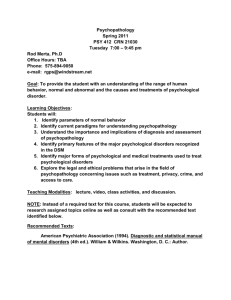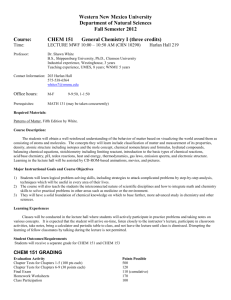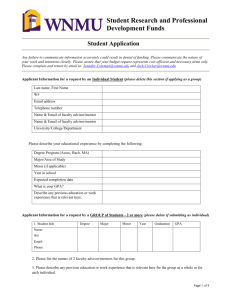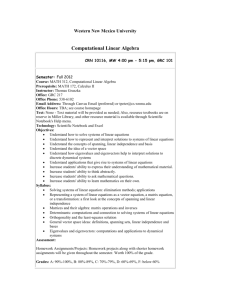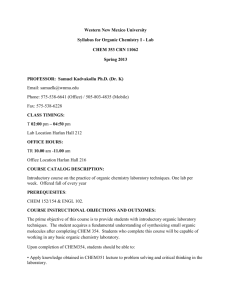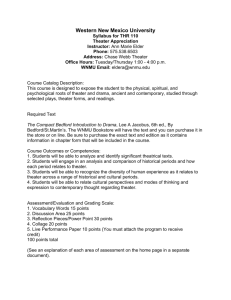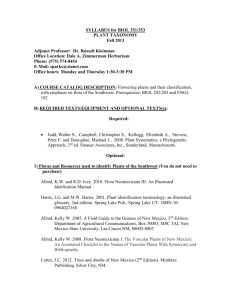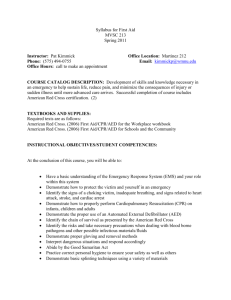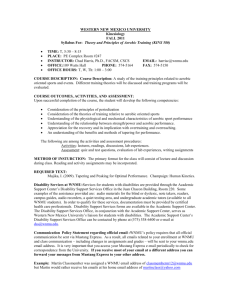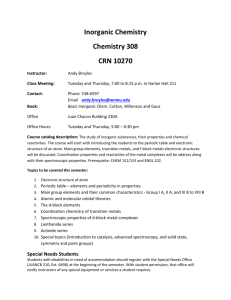CHEM 152 20454 - Western New Mexico University
advertisement
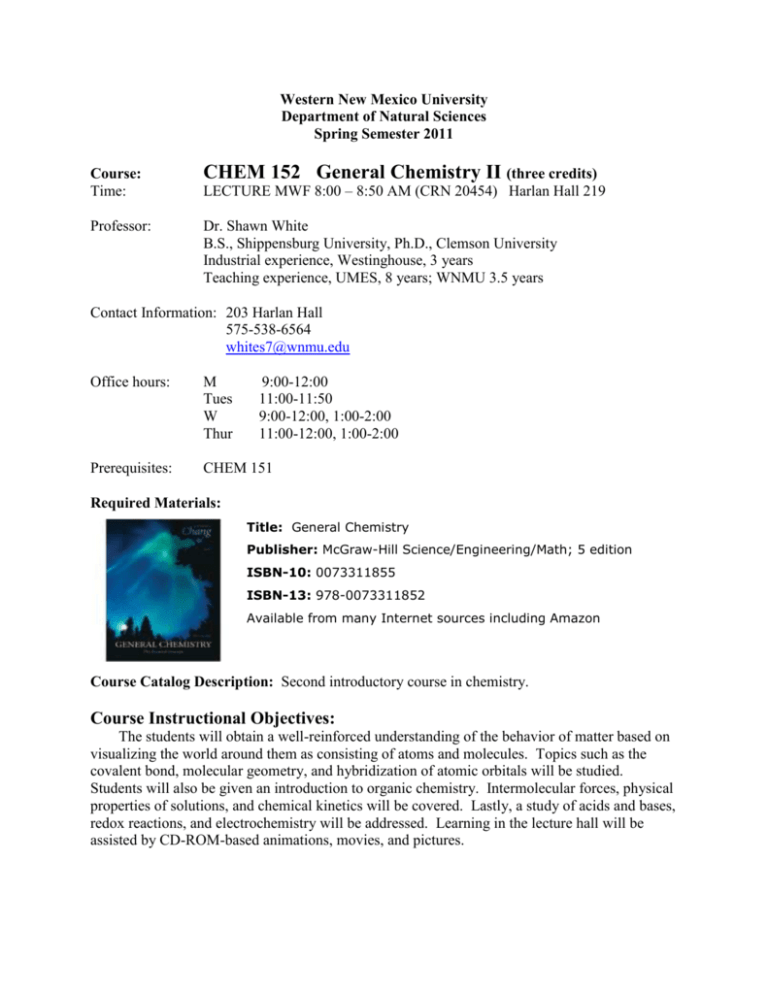
Western New Mexico University Department of Natural Sciences Spring Semester 2011 Course: Time: CHEM 152 General Chemistry II (three credits) Professor: Dr. Shawn White B.S., Shippensburg University, Ph.D., Clemson University Industrial experience, Westinghouse, 3 years Teaching experience, UMES, 8 years; WNMU 3.5 years LECTURE MWF 8:00 – 8:50 AM (CRN 20454) Harlan Hall 219 Contact Information: 203 Harlan Hall 575-538-6564 whites7@wnmu.edu Office hours: M Tues W Thur 9:00-12:00 11:00-11:50 9:00-12:00, 1:00-2:00 11:00-12:00, 1:00-2:00 Prerequisites: CHEM 151 Required Materials: Title: General Chemistry Publisher: McGraw-Hill Science/Engineering/Math; 5 edition ISBN-10: 0073311855 ISBN-13: 978-0073311852 Available from many Internet sources including Amazon Course Catalog Description: Second introductory course in chemistry. Course Instructional Objectives: The students will obtain a well-reinforced understanding of the behavior of matter based on visualizing the world around them as consisting of atoms and molecules. Topics such as the covalent bond, molecular geometry, and hybridization of atomic orbitals will be studied. Students will also be given an introduction to organic chemistry. Intermolecular forces, physical properties of solutions, and chemical kinetics will be covered. Lastly, a study of acids and bases, redox reactions, and electrochemistry will be addressed. Learning in the lecture hall will be assisted by CD-ROM-based animations, movies, and pictures. Course Outcomes or Competencies: 1) Students will learn logical problem-solving skills, including strategies to attack complicated problems by step-by-step analysis, techniques which will be useful in every area of their lives. 2) The course will also teach the students the interconnected nature of scientific disciplines and how to integrate math and chemistry skills to solve practical problems in other areas such as medicine or the environment. 3) They will have a solid foundation of chemical knowledge on which to base further, more advanced study in chemistry and other sciences. Learning Experiences Classes will be conducted in the lecture hall where students will actively participate in practice problems and taking notes on various concepts. It is expected that the student will arrive on-time, listen closely to the instructor’s lecture, participate in classroom activities, take notes, bring a calculator and periodic table to class, and not leave the lecture until class is dismissed. Disrupting the learning of fellow classmates by talking during the lecture is not permitted. Student Outcomes/Requirements Students will receive a separate grade for CHEM 152 and CHEM 154 CHEM 152 GRADING Evaluation Activity Tests Light and Matter(8) and Quantum Mechanics(9) CH 9 and 10 CH 11 CH 12 and 13 CH 14 and 15 CH 16 and 19 Final Exam (cumulative) Class Participation Points Possible 75 125 150 125 150 125 150 100 CHAPTER TESTS: There will be 50-minute tests given during the semester. FINAL EXAM: The final exam will consist of 40-60 questions. The final exam will be comprehensive, covering the entire semester. CLASS PARTICIPATION: Attendance (including on-time attendance), class preparation, and academic attitude are worth 100 points of the class grade. Student should attend class unless they are ill, have a university sponsored athletic event, or a religious observance. Students who arrive on time will earn a full day’s credit. Students who arrive late to class (after 8:00) will still earn some credit for attendance (counts as one half-day). Student should be prepared for the academic environment which entails bringing a notebook, something to write with, a calculator, and your chemistry book to class each day. Your academic attitude will be determined by how well you answer questions in class especially with regard to the assigned homework problems. The grading scale for Class Performance is shown below, note that there is no penalty for the first unexcused absence and only a small penalty for the next two. Number of Days of Unsatisfactory Class Performance 1 2 3 4 Class Performance Grade (points) 100 90 80 0 Students missing 4 or more lectures without a valid excuse will be dropped from the course (see p. 63 of the University catalog). TESTING PROCEDURE: Student should bring a calculator with them to the test. After the test has started, students are not expected to leave the testing area until they are finished with the test. Please bring tissues for allergies or colds and visit the restrooms before the exam. Clear your calculator memory of any mathematical or chemical formulas as these may be checked at random. Cell phones cannot be used during the exam including using them for a calculator. Each student must have their own calculator. Students using their calculators to cheat on an exam will be prosecuted under the university’s academic dishonesty procedures. The minimum penalty for academic dishonesty is the failure of the course and the maximum penalty is dismissal from the University. MAKE-UP POLICY: To make up missed chapter tests, the student must turn in an excuse or call the instructor not more than three days after the absence. The excuse must include a cover page with the title of “Chemistry 152 Excuse" at the top. The cover page should also include the student’s name, the date they were absent, the activity that was missed, and supporting documentation. Health-related absences should be accompanied by a note from the student health center or doctor. Students attending funerals can simply provide the name and telephone number of the appropriate funeral home director. Student athletes who are absent due to a university sponsored event should attach a note from their coach. Absences due to outside employment are not generally considered excused absences. Students must turn in a written excuse in order to be eligible to make up work. Example of an Excuse: Chemistry 152 Excuse Name: Raymond Sedillo Date of Absence: October 16 Activity Missed: Chapter Test 14 Reason: Illness Documentation: A note from the health center is enclosed. TENTATIVE LECTURE SCHEDULE OF CHEM 152 DATE Jan 10 Jan 17 Jan 21 Feb Mar 4 Mar 7-11 April Apr 1 Apr 22 May 6 TOPICS Light and Matter(8) and Quantum Mechanics(9) Martin Luther King, Jr Day (no class) CH 9 Chemical Bonding I: The Covalent Bond Last day to Add/Drop CH 10 Chemical Bonding II: Molecular Geometry and Hybridization of Atomic Orbitals CH 11 Introduction to Organic Chemistry CH 12 Intermolecular Forces And Liquids and Solids CH 13 Physical Properties of Solutions Faculty Assessment (no class) CH 14 Chemical Kinetics Spring Break CH 15 Chemical Equilibrium Last Day to Withdraw Spring Holiday CH 16 Acids and Bases CH 19 Redox Reactions and Electrochemistry last day of class FINAL EXAM: Wednesday May 11 7:30 AM Disability Services at Western New Mexico University: Services for students with disabilities are provided through the Academic Support Center’s Disability Services Office in the Juan Chacon Building, Room 220. Some examples of the assistance provided are: audio materials for the blind or dyslexic, note takers, readers, campus guides, audio recorders, a quiet testing area, and undergraduate academic tutors. In order to qualify for these services, documentation must be provided by qualified professionals on an annual basis. Disability Services forms are available in the Academic Support Center. The Disability Services Office, in conjunction with the Academic Support Center, serves as Western New Mexico University's liaison for students with disabilities. WNMU Inclement Weather Procedures Inclement weather: Refer to the OTA Student Handbook for notification procedures. In the event that classes are closed during the scheduled final exam for this class the following procedure will be followed: __online exam_________ The decision on whether to close the University will be based on the condition of the campus streets and parking lots and the surrounding main arteries. It will also take into consideration when Law Enforcement close down roads in and out of Silver City, Deming, Lordsburg, and Truth or Consequences. The University’s inclement weather procedures will be communicated to the entire University, as deemed necessary. Weather closing/delay information will be made available in the following ways: 1. WNMU webpage 2. WNMU Mustang Express 3. Radio Stations a. KNFT-FM 102.9FM (Silver City) b. KPSA-FM 37.7FM (Lordsburg) c. KSCQ-FM 92.2FM (Silver City) d. KOTS 1230 AM (Deming) e. KDEM FM 94.3FM (Deming) f. KNUW FM 95.1FM (Silver City) g. KCHS 1400 AM (Truth or Consequences) 4. TV Stations a. KOAT – TV (Albuquerque) b. KOB – TV (Albuquerque) c. KRQE – TV (Albuquerque) d. CATS – TV (Silver City) Communication Policy Statement regarding official email :WNMU’s policy requires that all official communication be sent via Mustang Express. As a result, all emails related to your enrollment at WNMU and class communication – including changes in assignments and grades – will be sent to your wnmu.edu email address. It is very important that you access your Mustang Express e-mail periodically to check for correspondence from the University. If you receive most of your email at a different address you can forward your messages from Mustang Express to your other address. Example: Martin Classmember was assigned a WNMU email address of classmemberm12@wnmu.edu but Martin would rather receive his emails at his home email address of martinclass@yahoo.com Martin would follow the direction provided at http://www.wnmu.edu/campusdocs/direction%20for%20forwarding%20email.htm WNMU Policy on Email Passwords: WNMU requires that passwords for access to all of the protected software, programs, and applications will be robust, including complexity in the number of characters required, the combination of characters required, and the frequency in which passwords are required to be changed. Minimum complexity shall include: Passwords shall contain at least six (6) characters. Passwords shall contain at least one capital (upper case) letter, and at least one symbol (numbers and characters such as @ # $ % & *). Passwords shall be changed at least every 90 days. (8/6/08) Academic Integrity: Each student shall observe standards of honesty and integrity in academic work as defined in the WNMU catalog. Violations of academic integrity include “any behavior that misrepresents of falsifies a student’s knowledge, skills or ability with the goal of unjustified or illegitimate evaluation or gain” (WNMU Faculty Handbook, 2008). Generally violations of the academic integrity include cheating and plagiarism. Refer to the catalog for definitions. Penalties for infractions of academic integrity in this class are as follows: Plagiarism: “the intentional or unintentional representation of another’s work as one’s own without proper acknowledgement of the original author or creator of the work” (WNMU Faculty Handbook, 2008) Penalties: F in the class Cheating: “using or attempting to use unauthorized materials…and unauthorized collaboration with others, copying the work of another or any action that presents the work of others to misrepresent the student’s knowledge” (WNMU Faculty Handbook, 2008) Penalties: F in the class
